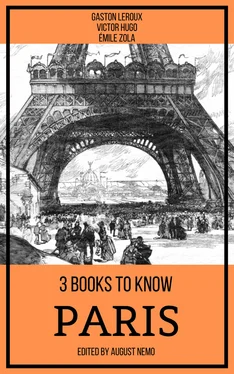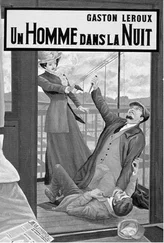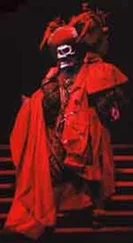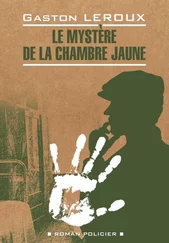This priest was Archdeacon Dom Claude Frollo.
The cloud descended more blackly than ever upon Quasimodo’s brow. The smile was still mingled with it for a time, but was bitter, discouraged, profoundly sad.
Time passed on. He had been there at least an hour and a half, lacerated, maltreated, mocked incessantly, and almost stoned.
All at once he moved again in his chains with redoubled despair, which made the whole framework that bore him tremble, and, breaking the silence which he had obstinately preserved hitherto, he cried in a hoarse and furious voice, which resembled a bark rather than a human cry, and which was drowned in the noise of the hoots—“Drink!”
This exclamation of distress, far from exciting compassion, only added amusement to the good Parisian populace who surrounded the ladder, and who, it must be confessed, taken in the mass and as a multitude, was then no less cruel and brutal than that horrible tribe of robbers among whom we have already conducted the reader, and which was simply the lower stratum of the populace. Not a voice was raised around the unhappy victim, except to jeer at his thirst. It is certain that at that moment he was more grotesque and repulsive than pitiable, with his face purple and dripping, his eye wild, his mouth foaming with rage and pain, and his tongue lolling half out. It must also be stated that if a charitable soul of a bourgeois or bourgeoise, in the rabble, had attempted to carry a glass of water to that wretched creature in torment, there reigned around the infamous steps of the pillory such a prejudice of shame and ignominy, that it would have sufficed to repulse the good Samaritan.
At the expiration of a few moments, Quasimodo cast a desperate glance upon the crowd, and repeated in a voice still more heartrending: “Drink!”
And all began to laugh.
“Drink this!” cried Robin Poussepain, throwing in his face a sponge which had been soaked in the gutter. “There, you deaf villain, I’m your debtor.”
A woman hurled a stone at his head,—
“That will teach you to wake us up at night with your peal of a dammed soul.”
“He, good, my son!” howled a cripple, making an effort to reach him with his crutch, “will you cast any more spells on us from the top of the towers of Notre-Dame?”
“Here’s a drinking cup!” chimed in a man, flinging a broken jug at his breast. “‘Twas you that made my wife, simply because she passed near you, give birth to a child with two heads!”
“And my cat bring forth a kitten with six paws!” yelped an old crone, launching a brick at him.
“Drink!” repeated Quasimodo panting, and for the third time.
At that moment he beheld the crowd give way. A young girl, fantastically dressed, emerged from the throng. She was accompanied by a little white goat with gilded horns, and carried a tambourine in her hand.
Quasimodo’s eyes sparkled. It was the gypsy whom he had attempted to carry off on the preceding night, a misdeed for which he was dimly conscious that he was being punished at that very moment; which was not in the least the case, since he was being chastised only for the misfortune of being deaf, and of having been judged by a deaf man. He doubted not that she had come to wreak her vengeance also, and to deal her blow like the rest.
He beheld her, in fact, mount the ladder rapidly. Wrath and spite suffocate him. He would have liked to make the pillory crumble into ruins, and if the lightning of his eye could have dealt death, the gypsy would have been reduced to powder before she reached the platform.
She approached, without uttering a syllable, the victim who writhed in a vain effort to escape her, and detaching a gourd from her girdle, she raised it gently to the parched lips of the miserable man.
Then, from that eye which had been, up to that moment, so dry and burning, a big tear was seen to fall, and roll slowly down that deformed visage so long contracted with despair. It was the first, in all probability, that the unfortunate man had ever shed.
Meanwhile, he had forgotten to drink. The gypsy made her little pout, from impatience, and pressed the spout to the tusked month of Quasimodo, with a smile.
He drank with deep draughts. His thirst was burning.
When he had finished, the wretch protruded his black lips, no doubt, with the object of kissing the beautiful hand which had just succoured him. But the young girl, who was, perhaps, somewhat distrustful, and who remembered the violent attempt of the night, withdrew her hand with the frightened gesture of a child who is afraid of being bitten by a beast.
Then the poor deaf man fixed on her a look full of reproach and inexpressible sadness.
It would have been a touching spectacle anywhere,—this beautiful, fresh, pure, and charming girl, who was at the same time so weak, thus hastening to the relief of so much misery, deformity, and malevolence. On the pillory, the spectacle was sublime.
The very populace were captivated by it, and began to clap their hands, crying,—
“Noel! Noel!”
It was at that moment that the recluse caught sight, from the window of her bole, of the gypsy on the pillory, and hurled at her her sinister imprecation,—
“Accursed be thou, daughter of Egypt! Accursed! accursed!”
CHAPTER V. END OF THE STORY OF THE CAKE.
––––––––
LA ESMERALDA TURNED pale and descended from the pillory, staggering as she went. The voice of the recluse still pursued her,—
“Descend! descend! Thief of Egypt! thou shalt ascend it once more!”
“The sacked nun is in one of her tantrums,” muttered the populace; and that was the end of it. For that sort of woman was feared; which rendered them sacred. People did not then willingly attack one who prayed day and night.
The hour had arrived for removing Quasimodo. He was unbound, the crowd dispersed.
Near the Grand Pont, Mahiette, who was returning with her two companions, suddenly halted,—
“By the way, Eustache! what did you do with that cake?”
“Mother,” said the child, “while you were talking with that lady in the bole, a big dog took a bite of my cake, and then I bit it also.”
“What, sir, did you eat the whole of it?” she went on.
“Mother, it was the dog. I told him, but he would not listen to me. Then I bit into it, also.”
“‘Tis a terrible child!” said the mother, smiling and scolding at one and the same time. “Do you see, Oudarde? He already eats all the fruit from the cherry-tree in our orchard of Charlerange. So his grandfather says that he will be a captain. Just let me catch you at it again, Master Eustache. Come along, you greedy fellow!”


CHAPTER I. THE DANGER OF CONFIDING ONE’S SECRET TO A GOAT.
––––––––

MANY WEEKS HAD ELAPSED.
The first of March had arrived. The sun, which Dubartas, that classic ancestor of periphrase, had not yet dubbed the “Grand-duke of Candles,” was none the less radiant and joyous on that account. It was one of those spring days which possesses so much sweetness and beauty, that all Paris turns out into the squares and promenades and celebrates them as though they were Sundays. In those days of brilliancy, warmth, and serenity, there is a certain hour above all others, when the façade of Notre-Dame should be admired. It is the moment when the sun, already declining towards the west, looks the cathedral almost full in the face. Its rays, growing more and more horizontal, withdraw slowly from the pavement of the square, and mount up the perpendicular façade, whose thousand bosses in high relief they cause to start out from the shadows, while the great central rose window flames like the eye of a cyclops, inflamed with the reflections of the forge.
Читать дальше












